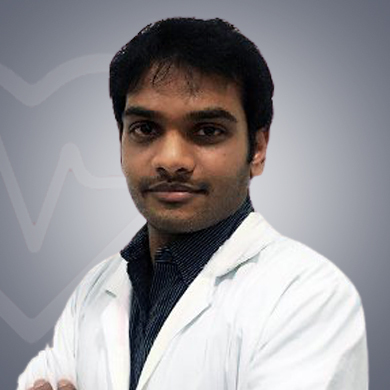
10 Years of experience
Speaks: English
Dr. Umashankar Prakasham is a Junior Consultant Surgical Oncologist, Laparoscopic Surgeon and General Surgeon at Gleneagles Global Clinic, Adyar. He has more than 8 years of experience and made such a huge name in a small period. He completed his MBBS from Manipal College of Medical Sciences (MCOMS) in 2004. Later, in the year 2011, he completed his MS in General Surgery from one of the prestigious Jawaharlal Nehru Medical College, Belgaum. Dr. Umashankar Prakasham passed DNB in Surgical Oncology from Apollo Cancer Institute, Chennai in 2015.
Dr. Umashankar Prakasham is an experienced and awarded doctor in his field of specialization. He believes in hard work and has gained expertise in Head and Neck Cancer, Colorectal Cancer, Gynecological Cancer, and Breast Cancer and in handling many Complex cases of cancer. Dr. Umashankar Prakasham is a renowned member of the Association of Surgeons of India (ASI). Dr. Prakasham has also been involved in many National Awareness programs related to cancer.
Here is the list of some of the conditions Dr Umashankar Prakasam treats:
Some women require surgery to remove the entire breast through mastectomy. The surgeons remove the breast tissues including nipple and the skin and the tissues that have the chest muscles. You may opt for breast reconstruction after a mastectomy.
Your symptoms depend on the type of cancer you are affected with, what is the stage, the location of cancer, and how far it has spread in the body. Cancer may cause any type of symptoms or signs. A sign can be seen by others, such as a fever, vomiting, and breathing. Symptoms can be perceived only by the person is suffering from the condition. Around 200 types of cancer are known till date and all these can cause different symptoms. Cancer can produce the below-listed conditions However, symptoms might vary from person to person. Every condition has its symptoms:
Dr Umashankar Prakasam works from 11 am to 6 pm on all days of the week, except Sunday.
Dr Umashankar Prakasam performs a wide variety of procedures for cancer treatment. Some of these are
The surgeon assesses the condition of the patient before performing any procedure to understand the risk associated with the procedure. The neurologist is popular for their high success rate and patient-centric approach which helps fast recovery of the patient. With vast experience in performing even the most complex cases with high precision and accuracy, the doctor follows medical protocols. There are two types of cancer surgery - minimally invasive surgery and open surgery. In open surgery, a surgical oncologist makes a large incision, to remove the tumor and some of the adjacent healthy tissues. Minimally invasive surgery involves laser surgery, cryosurgery, robotic surgery, laparoscopy, cryosurgery.

Share Your Experience about Dr. Umashankar Prakasam

A surgical oncologist is a general surgeon with training in various procedures for diagnosing or removing cancerous growths. The common procedures performed by a surgical oncologist are biopsy and surgery for the removal of cancerous growth. Surgical oncologists choose to perform surgeries to find out the locations where cancer has spread. While treating cancer, a surgical oncologist might remove cancerous tumors and surrounding healthy tissues, and nearby lymph nodes. The surgical procedures used will vary depending on the aim of the surgery. Surgical oncologists might do minimally invasive procedures or open surgeries.
The tests required before and during the consultation by a surgical oncologist include:
A biopsy is a procedure in which a piece of tissue from your body is removed to analyze it in a laboratory. It is an effective way to diagnose cancer.
Your primary doctor will refer you to a surgical oncologist when he finds your symptoms similar to that of cancer. The surgical oncologist will tell you to get some tests done to diagnose cancer. If cancer is diagnosed, the doctor will design your treatment plan which will include some surgical procedures. Below are some situations when you need to see a surgical oncologist: